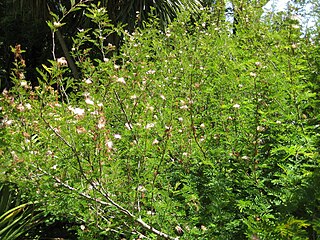
Smilax is a genus of about 300–350 species, found in the tropics and subtropics worldwide. They are climbing flowering plants, many of which are woody and/or thorny, in the monocotyledon family Smilacaceae, native throughout the tropical and subtropical regions of the world. Common names include catbriers, greenbriers, prickly-ivys and smilaxes. Sarsaparilla is a name used specifically for the Neotropical S. ornata as well as a catch-all term in particular for American species. Occasionally, the non-woody species such as the smooth herbaceous greenbrier are separated as genus Nemexia; they are commonly known by the rather ambiguous name carrion flowers.

Gentianaceae is a family of flowering plants of 103 genera and about 1600 species.

Centaurium (centaury) is a genus of 20 species in the gentian family (Gentianaceae), tribe Chironieae, subtribe Chironiinae. The genus was named after the centaur Chiron, famed in Greek mythology for his skill in medicinal herbs. It is distributed across Europe and Asia.

Calliandra is a genus of flowering plants in the pea family, Fabaceae, in the mimosoid clade of the subfamily Caesalpinioideae. It contains about 140 species that are native to tropical and subtropical regions of the Americas.

The genus Macrocarpaea, with 105 species and two hybrids of 0.5 m herbs, shrubs, epiphytes and small trees to 10 m tall, is the largest genus of the tribe Helieae of the gentian family (Gentianaceae). Species of Macrocarpaea have diurnal and nocturnal pollinators, visited during the day by hummingbirds, insects and butterflies, and at night by bats, moths and many different kinds of insects. The common name for the genus is 'Moon-gentian'. No species are known in cultivation.
Zeltnera beyrichii, commonly known as mountain pink, quinine weed or rock centaury, is an annual plant in the New World that blooms from late spring to early fall. Used as a medicinal plant by pioneers, the flowers were dried and used to reduce fevers.

Tournefortia, often called soldierbushes, is a genus of flowering plants in the borage family, Boraginaceae.

Zeltnera venusta is a species of flowering plant in the gentian family known by the common names California centaury, charming centaury and canchalagua. This centaury is native to much of California, southern Oregon, and northwest Baja California.

Zeltnera muehlenbergii is a species of annual herb commonly known as Monterey centaury and Muhlenberg's centaury. It is native to western North America from British Columbia to California and Nevada, where it commonly grows in forests and other moist places. This is an annual herb growing thin, erect, branching stems to heights anywhere between 10 centimeters and one meter. Oval-shaped leaves are arranged oppositely on the stem and are up to 2 or 3 centimeters long. The branching inflorescence bears many flowers, each with small bracts at its base. The flower has five oval-shaped petallike lobes each a few millimeters long.

Martin Martens was a Belgian botanist and chemist born in Maastricht, Netherlands.

Araujia is a small genus of perennial vines in the dogbane family first described as a genus in 1817. The group is native to South America.

Schenkia spicata is a species of annual herb in the family Gentianaceae. It has a very wide old world distribution, ranging from north Africa, through Europe and into Asia.

Zapoteca is a genus of flowering plants in the family Fabaceae, in the mimosoid clade of the subfamily Caesalpinioideae. It was separated from the genus Calliandra in 1986 on the basis of chromosome numbers, pollen, seedling structure, and other features. It is named in honour of the Zapotec peoples.

Schenkia is a genus of flowering plants in the gentian family, Gentianaceae. It is sometimes included in the genus Centaurium.

Zeltnera is a genus of flowering plants in the gentian family. It was erected in 2004 when the genus Centaurium was split. Genetic analysis revealed that Centaurium was polyphyletic, made up of plants that could be grouped into four clades. Each became a genus. Centaurium remained, but it is now limited to the Eurasian species. The Mexican species now belong to genus Gyrandra, and the Mediterranean and Australian plants are in genus Schenkia. The new name Zeltnera was given to this genus, which contains most of the North American centauries. There are about 25 species.

Tachiadenus is a plant genus in the gentian family (Gentianaceae), tribe Exaceae. It contains 12 species. The genus is endemic to Madagascar.

Vesalea is a plant genus in the honeysuckle family Caprifoliaceae. They are native to Mexico.
Zonanthus is a genus of flowering plants belonging to the family Gentianaceae.

Lamourouxia is a genus of flowering plants belonging to the family Orobanchaceae.
















